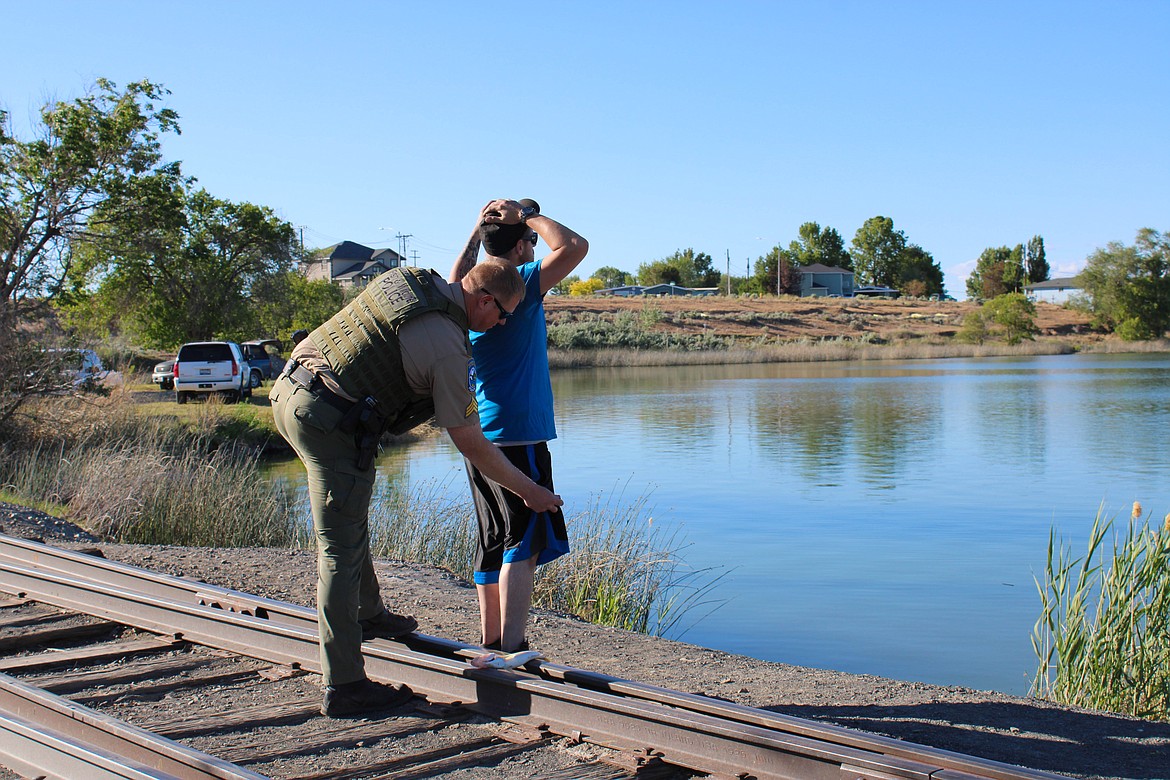Preserving opportunity: Outdoor recreation through the eyes of a game warden, Part 1
“I want my kids to be able to hunt. I want your kids to be able to hunt,” said Sgt. Chris Busching of the Washington Department of Fish & Wildlife police, driving down South Frontage Road outside of Moses Lake to the public hunting and fishing grounds Friday before Memorial Day.
“I want there to be opportunity out there for everybody else, and when poachers come out and shoot a deer out of season, that’s one less animal that you can go shoot legally,” he added. “If we don’t regulate this, if we over harvest it, there won’t be enough animals out there for future generations.”
Busching’s number one goal is protecting resources, he said, but by nature of the terrain – wide open spaces, recreationalists coming from all over, limited staff – the WDFW North Central Region, which includes Grant and Adams counties, does more general law enforcement than most.
The region is one of the department’s bigger detachments, he said, so it’s not all hunting and fishing violations. Regularly, he deals with DUIs, PUIs (pedestrians under the influence), felony warrants, all kinds of stuff.
Gang bangers come out and recreate, too, he said.
“You wouldn’t think, coming to Moses Lake, you’d deal a whole lot with the crazy stuff we run into, but it’s so vast,” he said. “There’s always something usually going on.”
This was one of the reasons Busching was selected to be followed for Animal Planet’s “Rugged Justice,” a show similar to “Cops,” but following WDFW police. Busching appears in the first two seasons and is the officer on the poster.
The experience was hectic, he said. It was a near-40 person crew total, with camera personnel in his rig, following in a van and corresponding from a hotel.
The added crew makes people nervous, Busching said. They either don’t want to talk or start showing off for the camera.
Busching is still recognized sometimes out in the field, he said.
Secret fishing spots mean something different to game wardens. Busching knows all the hidden locations where anglers likely don’t have licenses or have drugs or warrants.
He pulls up on an overlook where some people are fishing off a bridge below and scouts them with binoculars. When people don’t have licenses, he explains, sometimes they toss their poles and say they weren’t fishing.
What they don’t know is a warden has likely seen everything already.
Memorial Day weekend is always busy, Busching said. Thousands of tourists come from all over the state to dirt bike, camp and fish.
He gets out, walks along the railroad tracks and asks an angler coming his way how the fishing is.
The man caught a walleye, he says, holding it on display.
The chitchat element is important, Busching said. It’s about building rapport and trust, so a person’s first instinct isn’t to be defensive or dishonest.
Almost everyone asks for hunting or fishing advice. Busching, a hunter and a fisherman himself, is apt to give it. As such, he treats hunters and anglers the way he would want to be treated if the situation were in reverse, he said.
Busching checks the man’s name. Sure enough, he has three felony warrants and a first-degree suspended driver’s license.
Busching pats the man down, keeping a close eye for clenched fists or a bladed stance. He tells him to sit and wait for Moses Lake police to arrive.
After a few minutes, though, the case is “waived.” Due to COVID-19, jails aren’t accepting all warrants to save space for vital arrests.
Busching tells the man to call someone to take his truck and to find a ride home. Tonight, he got lucky.
“Normally when someone’s got a warrant, we automatically put them in handcuffs, because once they hear they have a warrant, either they comply, they run or they fight,” Busching said. “He was very compliant.”
Busching spent his first five years in law enforcement as a city cop for Omak, he said.
There, he always had a loop to patrol. Busching’s current reign is all of Grant, Adams and Douglas counties.
City police are always responding to calls, whereas game department police go out and find things, he said. Further, he’s always on his own schedule.
That doesn’t mean being a WDFW officer is a cakewalk, he said. Unlike city police, he’s almost always alone.
If someone has a weapon, it’s a huge red flag for a city cop. For Fish & Wildlife police, almost everyone they come in contact with has a knife or a gun.
Mostly sticking to backroads and recreational grounds, backup takes a lot longer to find him, too.
Look for Part 2 next Thursday in the Herald.



